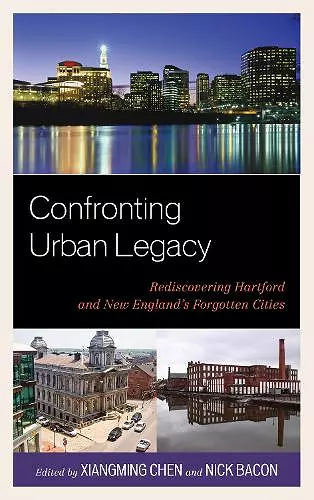Confronting Urban Legacy
Rediscovering Hartford and New England's Forgotten Cities
Xiangming Chen editor Nick Bacon editor
Format:Hardback
Publisher:Lexington Books
Published:18th Oct '13
Currently unavailable, and unfortunately no date known when it will be back
This hardback is available in another edition too:
- Paperback£48.00(9780739149430)

Confronting Urban Legacy fills a critical lacuna in urban scholarship. As almost all of the literature focuses on global cities and megacities, smaller, secondary cities, which actually hold the majority of the world’s population, are either critically misunderstood or unexamined in their entirety. This neglect not only biases scholars’ understanding of social and spatial dynamics toward very large global cities but also maintains a void in students’ learning. This book specifically explores the transformative relationship between globalization and urban transition in Hartford, Connecticut, while including crucial comparative chapters on other forgotten New England cities: Portland, Maine, along with Lawrence and Springfield, Massachusetts. Hartford’s transformation carries a striking imprint of globalization that has been largely missed: from its 17th century roots as New England first inland colonial settlement, to its emergence as one of the world’s most prosperous manufacturing and insurance metropolises, to its present configuration as one of America’s poorest post-industrial cities, which by still retaining a globally lucrative FIRE Sector is nevertheless surrounded by one of the nation’s most prosperous metropolitan regions. The myriad of dilemmas confronting Hartford calls for this book to take an interdisciplinary approach. The editors’ introduction places Hartford in a global comparative perspective; Part I provides rich historical delineations of the many rises and (not quite) falls of Hartford; Part II offers a broad contemporary treatment of Hartford by dissecting recent immigration and examining the demographic and educational dimensions of the city-suburban divide; and Part III unpacks Hartford’s current social, economic, and political situation and discusses what the city could become. Using the lessons from this book on Hartford and other underappreciated secondary cities in New England, urban scholars, leaders, and residents alike can gain a number of essential insights—both theoretical and practical.
Among urbanists, studies about megacities have been the prime agenda item in the research frontier. Not surprisingly, the literature on the world's largest cities is rich in number and coverage. However, there is a dearth of in-depth research about smaller cities considered to be second and third tier, and books on these smaller, lesser-known cities are few and far between. This book helps to fill that void by studying Hartford, Connecticut, and a couple of cities in other areas of New England. It is Hartford, however, that receives the most attention. Fifteen experts diffuse their experience on the region by mixing theory with applied practice, resulting in 14 very interesting chapters covering a wide range of topics, including the past, the present, and social, political, and economic issues. Not ignored is Hartford's position in the regional and global scene. Chapters examine the city's future potential with realistic conclusions, making it possible to gain an understanding of the city not previously available, particularly in a single volume. The rich bibliography found after each chapter can guide readers to greater insights. Maps, photographs, and tables complement the essays very well. Summing Up: Recommended. All academic levels/libraries. * CHOICE *
Despite their global impact, so-called 'secondary cities' like Hartford have been largely overlooked in academic circles. Confronting Urban Legacy is a bold and welcome break from this tradition, focusing not only on these cities' own fortunes, but their context within the cultural and economic shifts of the past four centuries. Given the current challenges facing cities like Hartford, the content of this volume provides ample fuel for further research and public discussion on the twenty-first-century futures of cities like Hartford. -- Pedro E. Segarra, Mayor of Hartford
Chen and Bacon offer a provocative view of the sprawling New England conurbation, where 'not great' cities like Hartford, Springfield, and Portland form a regional Middletown for the twenty-first century. This region is thoroughly global and highly problematic, divided between poor cities and rich suburbs, ethnic groups representing the Caribbean, Africa, and the U.S. South, a shrinking industrial and white-collar economy and a growing non-profit sector. Here, in a microcosm, is urban society. -- Sharon Zukin, Brooklyn College and CUNY Graduate Center
What is most striking about this latest book from Trinity’s Center for Urban and Global Studies is the breadth of the offerings: the fascinating chapters that delve into the multi-faceted complexities of urban life as it has unfolded in Trinity’s home city of Hartford over the last 400 years. The diverse range of authors includes not only well-established senior scholars but also a new generation of rising urbanists, including recent graduates of Trinity College who have added crucial insights on New England's vastly complicated and continuously changing urban environments. -- James F. Jones Jr., President and Trinity College Professor in the Humanities, Trinity College
Jane Jacobs famously wrote that the ‘foundation of cities is trade.’ I truly believe that in this century every city needs to understand its special position in the global economy and global networks, building from historic legacies and links. To this end, Chen and Bacon compile a rich and original set of research that positions Hartford and similar small New England cities firmly on the global stage. This is a great platform for rebirth and renewal. -- Bruce Katz, Brookings Institution and Founder, Metropolitan Policy Program
ISBN: 9780739149423
Dimensions: 237mm x 156mm x 22mm
Weight: 553g
324 pages